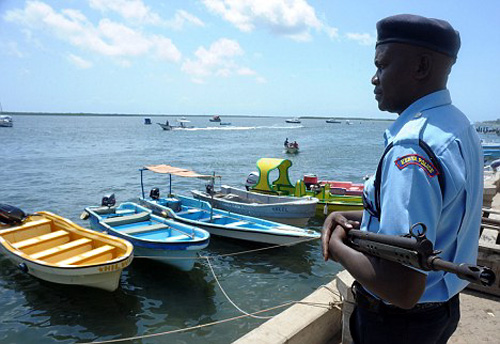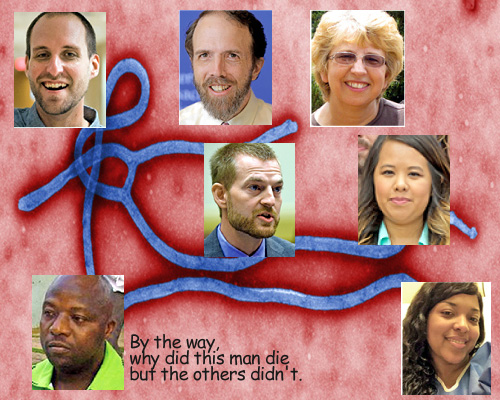 Terrorism is declining in Africa, my #2 Story of 2014.
Terrorism is declining in Africa, my #2 Story of 2014.
Terrorism is an almost meaningless word. At its root is war but differentiated from classic war by tactics of brutality and special cruelty.
Yet as we’ve seen in America this year, not even torture is easily associated with American definitions of terrorism. Conflict becomes terrorism in most people’s minds when they are so frightened that they react impulsively and thereby often become unable to defend themselves properly.
Napoleon at Waterloo or Bush at 9/11:
Scared to death. It’s a tactic that the Davids of the world retain as their most valuable, since today’s Goliath’s are incapable of being defeated by weapons other than fear.
Terrorism in Africa was definitely down in 2014 over recent years. From Mali to Egypt to Uganda to Mozambique, the incidents of terrorism were fewer in number than in 2013.
Readers of this blog will be focused on Kenya, because Americans control the narrative of terrorism in the world, and because Kenya is an African country they know more about than most other African countries.
Kenya has a close association to America. Its new constitution is modeled more by America’s than any single other country in the world. More recently Kenya became America’s proxy in the war in Somalia where Kenya remains the occupier and governor of a very fragile peace.
2013 was a horrible year for terrorism in Kenya. Since the horrible Westgate Mall attack in 2012, the Kenyan government began to react like most western governments when terrorized: clamp down.
Kenya beefed up security, increased military and police forces and began passing draconian laws. Much of this was counseled and paid for by America and undertaken exactly as America did after 9/11.
From my point of view, Kenya is even doing better than America after 9/11, because its reexamination of some of its draconian security laws is happening faster than it did in America.
America’s Patriot Act was enacted in October, 2001 and Obama ended all but 3 of its 10 provisions which will die if not renewed this year. Many persons myself included believe it had limited if any impact on reducing terrorism while greatly inhibiting personal liberties.
Kenya’s version of the Patriot Act was passed last month, but Kenya’s High Court suspended most of its key provisions Friday.
I hope the Kenyan High Court perseveres and strikes the law down for good, and I think there’s a good chance it will.
The Kenyan High Court is much more progressive than America’s Supreme Court. The Kenyan constitution, in fact, is more progressive than America’s.
The reason security has improved in Kenya, and the reason security improved in the U.S. after 9/11, had little to do with draconian new laws that culpable legislators hurried to enact.
The increased security was simply because of increased vigilance that was lacking before 9/11 or the Westgate Mall. We all know now how dismissive the Bush administration was of reports of imminent terrorism. Kenya’s dismissiveness may have been similar but was likely something else: lack of resources.
America and Britain have now beefed up Kenya’s resources, so while the explanation for why Kenya and the U.S. suffered dramatic attacks differs, renewed vigilence was similar in both countries, and given the west’s support, I think Kenya will continue to improve its security.
Should Kenya also put the kibosh on its horrible new security laws it will have also learned from America’s mistakes and will retain citizen liberties in a way America did not.
I think at that point the whole world – including America – will realize that America’s knee-jerk response to 9/11 was counter-productive and that “terrorism” is an eternal threat requiring measured but constant vigilance, not draconian security laws.
It’s fair to extrapolate Kenya’s experience to more or less all of Africa, with the notable exception of Nigeria.
Nigeria has never coalesced into a single republic well. The Biafran War was not a civil war like America’s. It was a much newer conflict of issues of ethnicity, class, privilege and income.
Boko Haram is the newest iteration of this contemporary conflict. There’s no question that its tactics are brutal and extreme, although the kidnaping of the school girls or the executions of young students is not a new technique in African conflicts.
Boko Haram’s ideologies are less global than local. This past weekend powerful Boko Haram forces overran a military base in Nigeria and could have easily taken more territory in neighboring Chad but didn’t.
Boko Haram is on the ascent because the Lagos government is on the decline. Crippled by a falling oil price as much as weak governance, Nigeria’s threat from Boko Haram is a serious internal one that ought not be extrapolated to Africa as a whole.
No conflict, no terrorism, is comforting. But in my long view of Africa, I’d say that things are getting better. More optimistically, Kenya’s chance to reframe how to deal with “terrorism” might be a model for the whole world. Take note, America.

